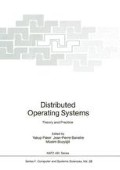Abstract
A multiprocessor consisting of independent processing elements with local memory and local system and application software is a special case of a distributed computer system (DCS). This paper describes such a system, the Heidelberg Polyp polyprocessor [1], its distributed operating system (DOS), and hardware support for distributed resource sharing. Current versions use 30 clusters with one or a few 32 bit microprocessors each [2,3]. Depending on the configuration, clusters may be general purpose or specialized servers. Clusters offering the same server functions can be grouped into pools of identical resources. Clusters using specialized hardware set up static pools. General purpose processor clusters can be specialized by software and can be assigned to pools dynamically. Hardware support is provided for handling pools independent of their sizes. Thus, adding new members to pools for speed up or shut-down of faulty members can be done software transparently. All processing clusters are interconnected by multiple buses for data transfers and interrupts. The system is managed decentrally by a DOS. A copy of this DOS is stored locally in each cluster. DOS requests may be executed in parallel and operate on common, but distributed system tables. The basic function of the DOS is to assign tasks with certain requirements to clusters supplying these functions and to establish communication between them. Some of the DOS functions may be time critical for certain applications. For that, hardware support is offered, e.g. for setting up an optimal dynamic load distribution within a heterogeneous DCS [4]. Pool-size independent system management as well as hardware scheduling is done via two resource sharing interconnection networks (RSIN) [5]. One of them, the Polybus system [6] allows to address pools as a whole and to request random selection of a member by hardware. The other RSIN, the Syncbus, allows to distribute priority queues of waiting tasks and uses a nonempty queue status as a distributed programmed interrupt to a certain pool. Application of boths RSINs is discussed in detail.
Access this chapter
Tax calculation will be finalised at checkout
Purchases are for personal use only
Preview
Unable to display preview. Download preview PDF.
References
Männer R., Deluigi B., Saaler W., Sauer T., v. Walter P.: Design and Realization of the Large-Scale Multi-Microprocessor System “Heidelberg Polyp”; Proc. 1st Int’l Conference on Computers and Applications, Beijing, China (1984) 264 – 270
Bartels P. H., Männer R., Shoemaker R. L., Paplanus S., Graham A.: Computer Configurations for the Processing of Diagnostic Imagery in Histopathology; in: Uhr L. et al., eds.: Evaluation of Multicomputers for Image Processing; Acad. Press, New York, N.Y. (1986)
Griswold W. G., Bartels P. H., Shoemaker R. L., Bartels H. G., Männer R., Hillman D.: Multiprocessor Computer System for Medical Image Processing; in: Duff M. J. B. et al, eds.: Intermediate Level Image Processing: Bonas Workshop on Languages, Architectures, and Algorithms for Image Processing; Acad. Press, New York, N.Y. (1986)
Männer R.: Hardware Task/Processor Scheduling in a Polyprocessor Environment; IEEE Trans. Comp. C-33, 7 (1984) 626 – 636
Wah B. W.: A Comparative Study of Distributed Resource Sharing on Multiprocessors; IEEE Trans. Comp. C-33, 8 (1984) 700–711
Männer R., Deluigi B., Saaler W., Sauer T., v. Walter P.: The Polybus ’ A Flexible and Fault-Tolerant Multiprocessor Interconnection; Interfaces in Computing 2,1 (1984) 45–68
McGehearty P. F.: Performance Evaluation of a Multiprocessor Under Interactive Workloads; Rep. CMU-CS-80–137, Carnegie Mellon Univ., Pittsburgh (1980)
Vaughan R. F., Anastas M. S.: Limiting Multiprocessor Performance Analysis; Proc. Int’l Conference on Parallel Processing (1979) 55 – 64
Rathi B. D., Tripathi A. R., Lipovski G. J.: Hardwired Resource Allocators for Reconfigurable Architectures; Proc. 1980 Int’l Conference on Parallel Processing (1980)109–117
Jenevein R., Degroot D., Lipovski G. J.: A Hardware Support Mechanism for Scheduling Resources in a Parallel Machine Environment; Proc. 8th Annual Symposium on Computer Architecture (1981) 57 – 66
Wah B. W., Hicks A.: Distributed Scheduling of Resources on Interconnection Networks; Proc. NCC (1982) 697 – 709
Author information
Authors and Affiliations
Editor information
Editors and Affiliations
Rights and permissions
Copyright information
© 1987 Springer-Verlag Berlin Heidelberg
About this paper
Cite this paper
Männer, R. (1987). Hardware Support for the Distributed Operating System of the Heidelberg Polyp Processor. In: Paker, Y., Banatre, JP., Bozyiğit, M. (eds) Distributed Operating Systems. NATO ASI Series, vol 28. Springer, Berlin, Heidelberg. https://doi.org/10.1007/978-3-642-46604-5_8
Download citation
DOI: https://doi.org/10.1007/978-3-642-46604-5_8
Publisher Name: Springer, Berlin, Heidelberg
Print ISBN: 978-3-642-46606-9
Online ISBN: 978-3-642-46604-5
eBook Packages: Springer Book Archive

